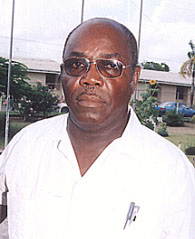August 18,2016 Source
Defence attorney Charles Ramson Jr yesterday said that the prosecution has failed to prove beyond a reasonable doubt that former Guyana Power and Light Inc (GPL) director Carvil Duncan did not receive authorisation to pay himself the $984,900 that he is accused of stealing from the company.
Ramson Jr was at the time presenting his closing arguments to Magistrate Leron Daly at the trial of Duncan, who is charged with the simple larceny of the money from the company.
Duncan is facing a charge that on March 31, 2015, at Georgetown, he stole $984,900, which was property of GPL. Duncan is also facing charges that he and another, on March 31, 2015, at Georgetown, conspired to steal $984,900, which was property of GPL, and that he, along with another conspired to steal $27,757,547 between May 7 and May 8, 2015, which was property of GPL.
The charges against him stem from payments that were made by himself and Aeshwar Deonarine. The $984,900 allegedly stolen by Duncan represents retroactive payments for his time on the GPL Board.

In his submission to the magistrate, Ramson Jr argued that the charge was misconceived and the court has no choice but to dismiss it. He noted that while evidence established that Duncan, who was one of the signatories to the company’s Republic Bank account, withdrew the money from the company’s account by way of a cheque, it has been established by precedent that a cheque cannot be the subject of simple larceny under the law.
Further, Ramson also questioned whether the money was the property of GPL, as is asserted in the charge. He argued that it has been established that money in a bank is not the property of the customer but the property of the bank, hence “all moneys deposited, held, debited or credited by Republic Bank of GPL’s account is or was never the property of GPL Inc but property of Republic Bank.”
He said the evidence in the case does not show that any money was stolen from GPL since the prosecution’s evidence showed that the account of GPL that is held at Republic Bank was debited to pay Duncan, who was a creditor to the bank.
“What transpired in this case is that the bank paid money on a cheque drawn on GPL’s account held at the Republic Bank on the basis of the authorised signatories of GPL,” he said, while adding that the prosecution did not see it fit to charge Duncan with an offence of stealing from the bank since he was duly authorised as a signatory to GPL’s account.
The attorney said the prosecution only alleged that Duncan stole money from GPL but he never obtained any cash from the company. He said that the cash at all times is the property of the bank, which honoured the instructions on the cheque that was signed by signatories on the account.
Ramson Jr added that any attempt by the prosecution to amend the charge at this stage, after closing its case, would be unfair and prejudicial to his client.
He further pointed out several holes in the prosecution’s case as it did not call on key witnesses, thereby failing to prove that Duncan was guilty beyond a reasonable doubt.
Ramson Jr said that the former cabinet secretary Dr Roger Luncheon was never questioned nor did he give a statement or evidence. He said Luncheon could have explained if he had communicated the authorisation to Duncan to make the retroactive payment to himself. He noted that other shareholder representatives, such as Irfaan Ali, were never questioned and he said it could be possible that a shareholder’s decision was taken and communicated to GPL Chairman Winston Brassington and or Duncan authorising retroactive payments for a period.
Ramson Jr closed by adding that the prosecutor did not lead evidence to satisfy the court that Duncan did not receive the authorisation from either the shareholder representatives, Cabinet Secretary or the Chairman of the Board to make the payment retroactive.
After Ramson Jr closed his case, the magistrate adjourned the matter until August 19 for the prosecution’s submissions.
